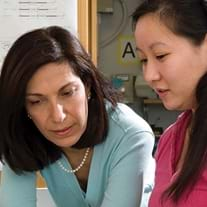Overcoming Imposter Syndrome to Empower Women in STEM
As a guest lecturer, Dr. Huba Zoghbi, recipient of the 2018 Ross Prize in Molecular Medicine observed “imposter syndrome” more often in women, compared to men. Here’s how we can change that.
Published October 1, 2018
By Kari Fischer, PhD
Academy Contributor

Huda Zoghbi, MD, is a highly decorated scientist, with multiple awards garnered for her work unveiling the genetic mutations underlying two rare neurodegenerative diseases: Rett syndrome and spinocerebellar ataxia.
After receiving the sixth annual Ross Prize in Molecular Medicine (2018), she confessed that she could not appreciate her success until well into her 50s. This is far too late for a woman in science, when many leave research careers before they even begin.
While traveling as a guest lecturer, meeting hundreds of young researchers, Dr. Zoghbi observed this same distrust in one’s own accomplishments, otherwise known as “imposter syndrome,” in women, but not in men.
“Many women doubted if they could be good enough; that they could move on to the next step of their careers.”
Fixing the “Leaky Pipeline”
These women are manifestations of the “leaky pipeline” — in 2015, only 35 percent of tenured biology professors were women, though they represented over half of the PhD candidates. Their career misgivings are one among many challenges women face, including an overlap in timing between postdoctoral fellowships, seeking tenure, and starting a family; potential psychiatric disorders and depression (one-third of PhDs are at risk); and pervasive gender discrimination. An understandably difficult path.
“I see the drive, the intellect, the value they bring to science, and it troubles me when I see them going on a job interview, not walking out of the lab with the same confidence as a man,” Dr. Zoghbi said in describing her own trainees.
Dr. Zoghbi’s approach for countering self-doubt is simple, and easy to apply while other barriers await institutional change. She uses the best tool a scientist has: evidence.
“Whenever a woman in my lab would tell me, ‘I just don’t know if I can make it,’ I would pull out my CV and show them where I was at their stage, and highlight how much more impressive they are.” She share shares her experience to effectively tell them “If I can do it you can do it” … “I think that simple act helped me keep many women in science.”
Balancing a STEM Career with Motherhood
She models her actions on the women who supported her own career. While crediting her scientific mentors for her success, Dr. Zoghbi also recognizes the importance of her “life mentors,” and the little moments that were impactful.
Upon returning to her neuropathology rotation, with a two-month-old daughter at home, she experienced the associated anxiety of a working mother who might be missing out.
While seated at a teaching microscope with Dr. Dawna Armstrong, former Professor of Pathology at Baylor, she remembered, “We were not even looking at each other, and she could sense my tension … We’re looking at brain section after brain section, and in the midst of that she said, ‘You know they sleep all the time at this age, you’re not missing much’.”
Just one reassuring sentence brought her instant relief, though this style of mentoring may not come naturally for everyone.
“I don’t expect every mentor to be super nurturing, and that’s okay…give your trainees an opportunity to find other mentors to help them in areas where you don’t feel qualified,” Dr. Zoghbi said, cautioning that in the same way small gestures can bolster a career, a few words can also derail one, even if that was not the intention.
“Women have shared with me, ‘I dropped out of science because my mentor said ‘X’, and that made me believe I can’t do it,’” she said. “What you say can have a lasting impact on your trainees.”
The Lasting Impact of the Ross Prize
On a larger scale, scientific prizes like the Ross Prize are another way to extend a message of affirmation to women.
“I get embarrassed by the attention,” Dr. Zoghbi admits. “[But] so many young girls emailed me, and told me that after watching the videos of [an acceptance] speech, now they want to be a scientist and they believe they can do it.”
The approbation and visibility female scientists receive from these awards galvanizes the next generation. With more mentors like Dr. Zoghbi, their biggest challenge will not be themselves, but the science itself — which is as it should be.
The Ross Prize in Molecular Medicine was established in conjunction with the Feinstein Institute for Medical Research and Molecular Medicine.
Sign up today to be a mentor so you can inspire tomorrow’s changemakers!
And read more about the Ross Prize and past awardees:
